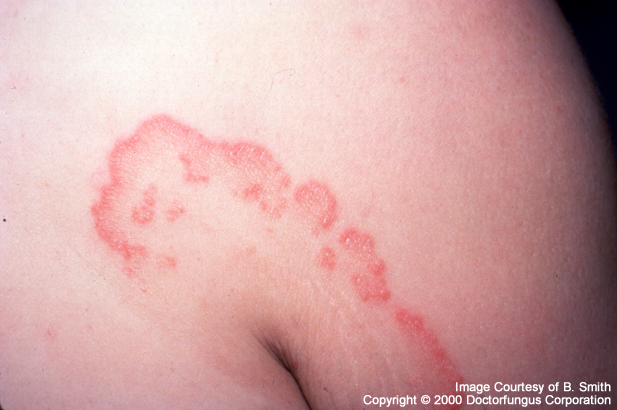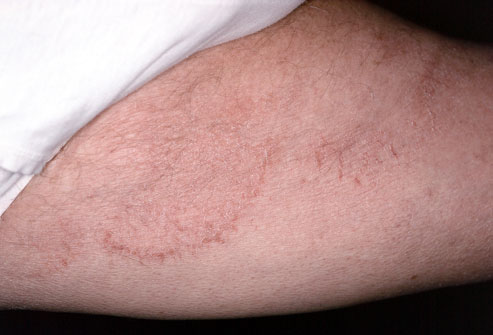Jock Itch
If you are male and engage in any type of rigorous exercise, then you undoubtedly have become familiar with a common, irritating condition called “jock itch.” There are a variety of other names associated with this affliction like jock rot, sweaty balls, or tinea cruris.

Although this condition is contracted principally by males, women are not immune to this infection and can suffer to the same degree as any man.
The symptoms are obvious. You feel a burning, sweaty, itching sensation in the groin area surrounding the genitals. The skin takes on a raw look and can begin peeling.
Your first instinct is to scratch the affected area incessantly and usually without much thought to it until you realize that the sensation is not dissipating and is actually spreading.
The infected area may also include the buttocks and inner thighs.
A look at the infected area canl reveal reddish, ring-shaped rashes and dampness. Although the infection is not serious, it can be extremely aggravating and embarrassing, especially if you are experiencing serious itching and are scratching the area in the presence of other people.
Jock Itch? Get Remedies Fast!
Causes
Jock itch, or jock rot, or whatever other appellation high school sophomores may give to this infection, is caused by a fungus called Trichophyton rubrum. It thrives in moist and damp areas of the body such as the genitals, groin or inner thighs. Sweating after exercise or even from being in hot, humid weather can cause the fungus to proliferate especially if you are wearing tight undergarments that can allow the fungus to proliferate.
Failing to bathe on a daily basis, especially if you exercise regularly or live in a humid environment, can make one susceptible. It has been suggested that a poor diet consisting of mostly junk foods, found in many an adolescent’s or teenager’s daily food regimen, can contribute to an infection. If you consume a great deal of fried, greasy or processed foods, you are weakening your immune system and not preventing this or any other infectious conditions from invading your body.
Risk Factors
It is obvious that maintaining a less than hygienic lifestyle is conducive to inviting infectious agents into your body. Other risk factors include obesity, which is nearing epidemic proportions in our country, as overweight people have a tendency to sweat easily. If they also fail to keep their bodies clean and dry, then their bodies are practically inviting any infection.
As noted above, eating a diet filled with greasy and fried foods will not stave off infections nor will the consumption of sugary foods and drinks or foods containing yeast. People who consume large amounts of alcohol which eventually becomes sugar are at risk as well.
Having a compromised immune system or having AIDS will put you at risk for this and any other infections, so it necessary to take any measures that will strengthen your immune system and lessen the chances of infection.
Prevention

Prevention of this common affliction is relatively easy. You could either just stop sweating or follow a healthier lifestyle that one should do in any event.
You should shower on a daily basis and take care to thoroughly dry the groin and inner thigh area.
Taking care to also dry the area between your toes will prevent athlete’s foot, another fungus that results in similar symptoms.
Dieting
A diet that is rich in vegetables and fruits will aid in prevention. These and other foods rich in omega-3 polyunsaturated fatty acids aid in the prevention of free radicals and strengthen the immune and cardiovascular systems.
Although few people meet the daily recommended servings of fruits and vegetables, one can at least severely limit, if not entirely omit, sodas, diet or otherwise, from one’s diet and stop frequenting fast food restaurants.
You might also consider adding garlic to your food. Small amounts are recommended as garlic can have an irritating effect on one’s stomach. Because garlic has long been regarded for its anti-fungal properties, and can add flavor to many dishes, this can be a welcome and tasty preventative measure.
If you exercise regularly, be aware that your body will continue to sweat for about 15 minutes after you have completed your routine and needs that much time to cool down. Taking a shower or bath immediately after exercising will not slow or decrease the time it takes your body to stop sweating, so wait 15 minutes before showering. Use an antibacterial soap and wash the groin and inner thigh areas.
Carefully dry these areas after your shower and apply a talcum powder to keep these areas dry and less likely to become damp or moist.
Treatment & Remedies
There are a variety of commercial lotions and sprays that you can purchase that are relatively costly, but are usually effective. These include a cold or freezing spray that provides instant relief, although you may have to use the entire contents of the can to achieve complete and lasting relief.
Home remedies work just as effectively and are much less costly. The following is a list of the more common home solutions to this irritating condition.
Garlic and Honey
An old but effective remedy is to combine garlic and honey. Chop the garlic into very fine pieces and mix it with organic or unfiltered honey and apply it to the infected skin. The garlic should probably be mixed with warm water first before combining it with honey. Many people regard this combination as an effective treatment for acne as the sulfur in the garlic acts to disinfect the bacteria.
The same theory should apply to the Trichophyton rubrum fungus that is causing the infection surrounding the genitals. The only side effect is that the garlic may cause some irritation, but the honey does act as a moisturizer and might counteract that effect.
Apple Cider Vinegar
Apple cider vinegar has long been touted as a health tonic for digestion, joint pain, asthma, blood pressure, burns, cancer sores, cholesterol, and athlete’s foot among many others. The acids in the vinegar act as antibacterial agents.
The solution is made by combining equal parts of apple cider vinegar and water and then placing it in the refrigerator in a spray bottle. The spray will have a cooling effect that will bring added relief when applied to the inflamed skin.
Bleach
Another suggested remedy is to dilute 2 tablespoons of bleach in 16 ounces of hot water. Soak a wash cloth in the solution and wash the infected areas. Bleach is a skin irritant, however, and failure to adequately or properly dilute it can result in damaging your skin even further.
Zinc Oxide
An easy remedy is to use zinc oxide commonly found in diaper rash cream. A drawback in using this substance is that there a number of people who are allergic to it. You should not use this as a topical remedy if you are also allergic to zinc, dimethicone, lanolin, cod liver oil, petroleum products, parabens, mineral oil or wax. If you suspect an allergic reaction, then you should consider an alternative solution.
Tea Tree Oil & Cornstarch
Tea tree oil is a popular alternative substance that has powerful antifungal qualities. It is also a natural antispetic and germicide. It has been used to treat canker sores, tooth and gum infections, head lice, yeast infections, and is a natural deodorizer.
One should take care not to use too much as it may irritate the skin, especially if you already have a sensitive skin condition. If you have a history of allergies, use a small concentration as a skin test to see if increased irritation occurs and to minimize any reaction. Tea tree oil is a topical solution and must not be ingested.
Cornstarch is another useful and common remedy for treatment of jock itch. Cornstarch is derived from dried corn kernals and is the primary ingredient in baby powders. It can help the skin achieve a fresh, dry feeling and soothe the burning, raw effects from scratching the infected areas. Cornstarch can cause allergic reactions in people who are sensitive or allergic to corn or to any corn products.
Calendula
Calendula, used in cream form, is a natural antiseptic and anti-inflammatory substance. Derived from calendula flowers or marigolds, it possesses valuable skin healing properties and should be an excellent ointment to use.
It is also used for burns, cuts, insect bites, cracked and rough skin as well as athlete’s foot. Side effects from using calendula include dermatitis, allergies, lipid and protein reduction. If you are using narcotics or antidepressants or have blood pressure or glucose issues, you should consult with your physician even though you may be using relatively low doses of this substance.
Lavender Oil
Lavender oil, although mainly used for aromatherapy and as a remedy to relieve stress, headaches, depression and anxiety, is also known for its antiseptic and antifungal properties. It is useful in rapidly healing wounds, cuts and sunburn, and aids in the formation of scar tissue.
Because lavender is an herb and contains active compounds that can trigger side effects and interact with other herbs, supplements or medications, one should probably consult with either a physician or a health care provider with an expertise in botanical ingredients before using. Pregnant and breast-feeding women should avoid using lavender at all.
Vitamin E
Vitamin e has long been known to promote skin healing. It has traditionally been used in the treatment of sunburn and psoriasis and has been promoted for its anti-aging benefits. As a lotion, it protects the epidermis layer of the skin from UV rays.
Recent studies, however, have questioned the use of vitamin e creams and claim that it may worsen the appearance of scars. These studies are not supported by others that show that the beneficial effects far outweigh any preliminary studies to the contrary. If used topically, there are few if any known side effects.
Dandruff Shampoo
Some people have attested to the positive effects of dandruff shampoo for curing jock itch infection. Dandruff occurs as skin cells renew and shed old skin at a faster rate than normal. A severe case of flaking scalp may be related to an overgrowth of a type of yeast which occurs naturally on the skin. Many dandruff shampoos contain one or more ingredients of salicylic acid, sulfur, and zinc pyrithione.
Salicylic Acid
Salicylic acid is a mild antiseptic and aids in the penetration of antifungal agents and causes shedding of the outer layers of the skin. Sulfur is an antifungal agent that is used to get rid of the yeast that causes dandruff in some people. It is easy to see how the use of this type of shampoo may be a healing tonic for jock fungus.
The side effects of using a shampoo on fungus causing jock itch are rare, but the salicylic acid and sulfur might cause some burning or increased itching of the skin. Zinc pyrithione has also been known to cause pimples, so one should look for this if using a product containing this ingredient.
Mix and Match
One final remedy is a combination of tea tree oil, calendula and vitamin e. These ingredients create a healing antiseptic that calms and soothes the skin and is said to be effective against inflammation. Vitamin e acts as a natural preservative as well as protecting the skin.
Use whatever remedy sounds plausible to you keeping in mind the possible side effects and using caution if you do have other medical conditions for which you are taking prescribed medication. Do not overuse any of these home remedies and stop applying them immediately if further irritation occurs.

1 Comment
Thanks for this!